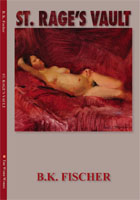St. Rage’s Vault
B.K. Fischer
The Word Works, 2013
Paperback, 84 pp, $15.00
ISBN 978-091538084-8
Purchase Link
Reviewed by PQ Contributing Editor Ann E. Michael
Gestation can refer to many in-process creations; we gestate ideas, theories, revolutions and much more before attaining a recognizable outcome. Poems and other works of art need to develop, hidden and protected in their creators’ minds, often for a long spell. The relationship of creative gestation to physical gravidity seems more synonymous than metaphorical, a connection B.K. Fischer’s latest collection makes use of. St. Rage’s Vault takes the concept of gestation in several directions at once with poems that can be read as commentaries on artistic inspiration, ekphrasis, creation in a general sense, the physiological nine months humans spend in the womb, and the need for protection—a vessel, a vault—during the crucial period of formation. The poems are numbered Week 1 through Week 40 and the collection divided into trimesters. Thus, the most obvious interpretation of St. Rage’s Vault is that Fischer’s poems portray pregnancy. The opening poems, however, also suggest that human thought and artistic creation are also undergoing inception, and that beginnings are a struggle.
The first poem, drawn, appropriately, from an annunciation painting, is titled instead “Interruption.” The figure of Mary, disturbed from her ordinary life, appears taken aback not just in awe, as the Gospel depicts, but also with a bit of irritation. The second stanza conveys the feeling:
Can’t you see she’s trying to read?
She keeps her thumb in the book,
thinking she’ll get back to it
Fischer moves from the distractedness of unexpected conception toward the “good, dumbstruck” acceptance of Rodin’s La Pensée, who has “consented to composure.” But the consent doesn’t last long. The turmoil of a changing physical body, its “swell in hip and jowl,” energizes the poems and reflects how the germ of an idea roils and worries at the inquisitive mind.
In “Week 8 (Organogenesis)” she furthers the fact of what the body experiences while pushing the metaphor of an aesthetic: “the body as achievement, / indisputable iron, / beauty of the thing. / Body as evidence…” Near-puns and double-meanings abound whenever a writer employs such a basic object as a body in her work, and Fischer manages this feat without resorting to clichés. The title poem offers an example of such wordplay—I don’t want to spoil the poem’s surprise with a reveal—that connects wonderfully with the themes of protection and containment while creation percolates.
The female form has been portrayed in artwork for thousands of years, and Fischer’s poems remind the reader of the symbolism and cultural freight the woman’s body carries, especially when the body harbors another life. Several of the paintings alluded to in these 40 poems are by Alice Neel, her portraits of pregnant women straightforwardly displaying the roundedness and obviousness of pregnancy, its effects on a woman’s figure as the unborn child takes shape. In “Week 27 (Figure),” which references a 1975 Neel Painting, Fischer writes: “No globe, no fruit—only / the redundancy of her desire.” And as the collection moves into the later months of this gestation, that form begins to acclimate to its hugeness like a prehistoric goddess totem, “a magic marker Venus de Milo,” desire everywhere. A very funny poem, “Week 30 (Maternity Bathing Suit),” brought back memories of the maternity suit I wore years ago. The snappy internal rhyming of the couplets and jaunty diction celebrate the image:
her daisy-decal polka-dot
pliant bingo bottom buoyant enough
to balance an elephantine arabesque
off the ladder, smile
at mister-smug-one shrunk
in his trunks in front of
her flagrant magenta bellyful
of flutter-kicks…
St. Rage’s Vault offers the reader the kind of depth that will withstand several readings and several interpretations. Is it about pregnancy, about the visual arts, about the creative process? As a person who has given birth, and as a person who practices the creative process in myriad ways, I know I will be re-reading this collection not just for Fischer’s facility with poetic technique but for the many possibilities these poems contain.
Ann E. Michael is a poet, essayist, and educator whose most recent poetry collection is Water-Rites (2012). She lives in eastern PA where she is Writing Coordinator at DeSales University. Her website: www.annemichael.com.

